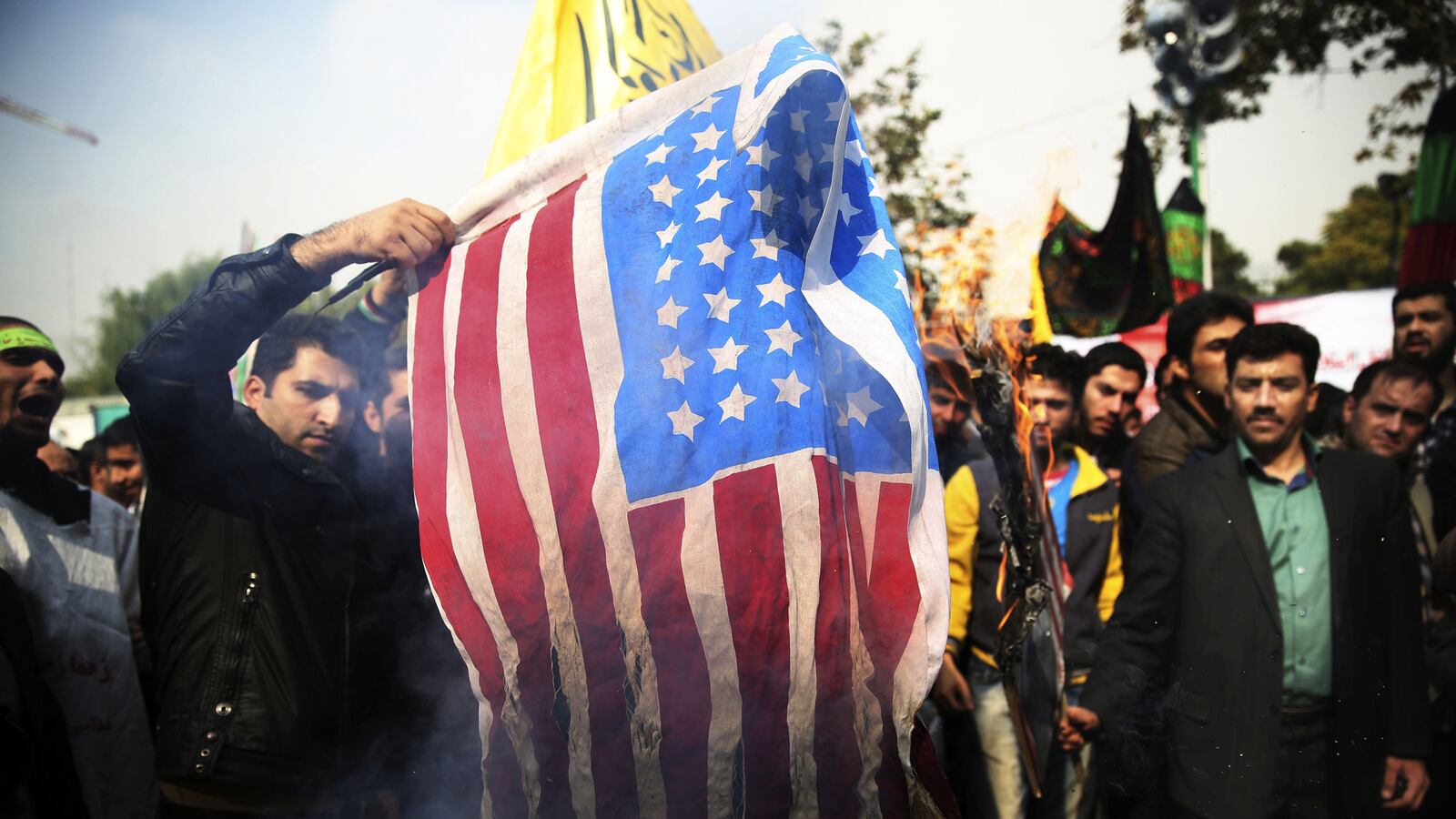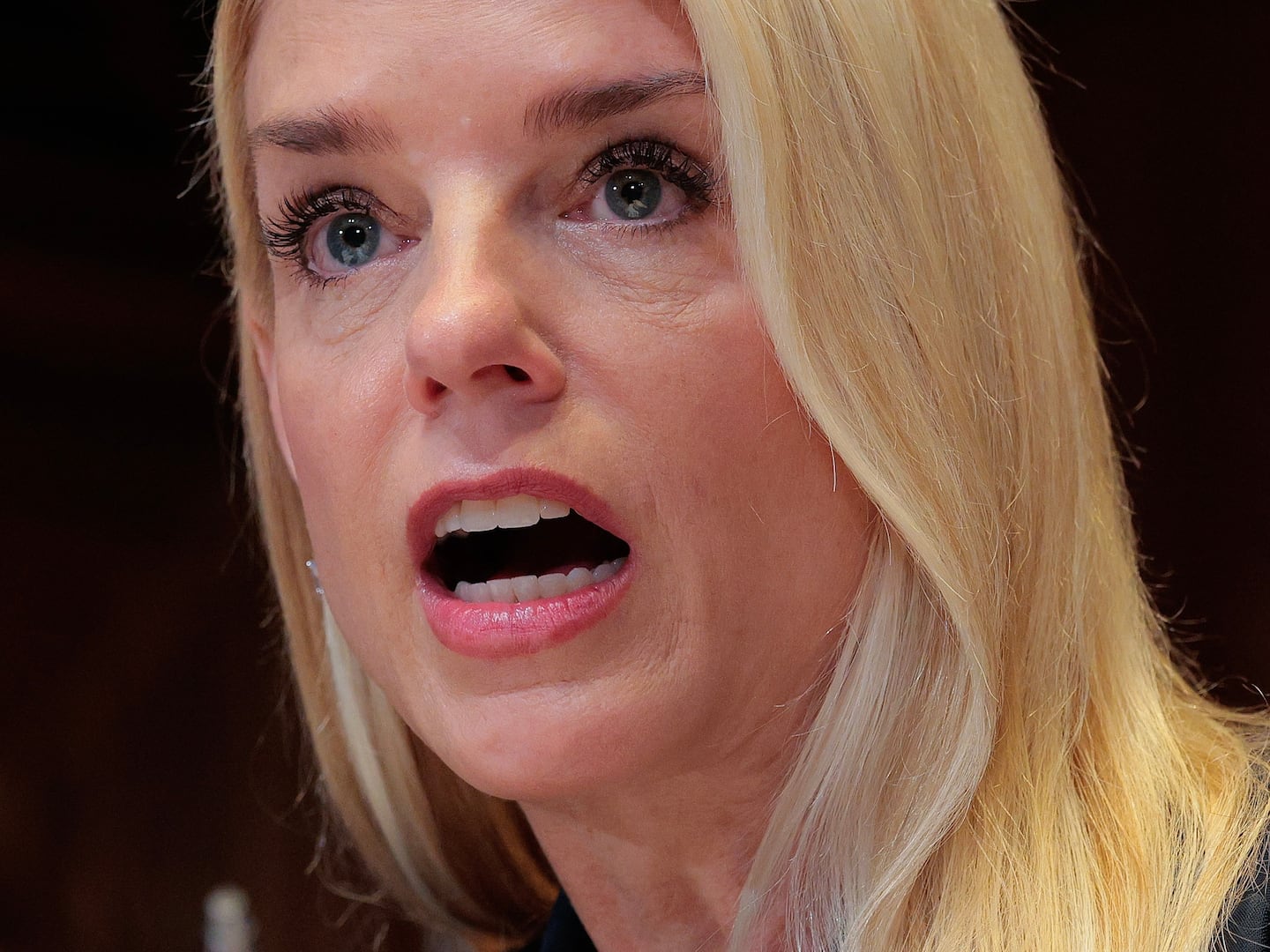If last month’s interim nuclear agreement with Iran ultimately fails, former New York Times editor and columnist Bill Keller will know who to blame: American “hard-liners.”

"Iran's Hardliners, and Ours," is the title of a post on Keller's blog from earlier this week. We all know about Iranian hardliners: bearded clerics who call for stoning adulterers, Basij militiamen fighting alongside Bashar al-Assad’s murder machine in Syria, the crowds who chant “Death to America” at every Friday prayers. But who are America’s hardliners? “When John Bolton, the most enthusiastic armchair warrior of the George W. Bush brigade, and Mohammad Reza Naqdi, the head of Iran’s brutal Basij paramilitary, are both unhappy, you’ve probably done something right,” Keller assures his right-thinking Times readers. “One reason for cheer is that the interim agreement has brought together the hard-liners, theirs and ours, in reciprocal dismay.”
The former UN Ambassador’s moustache may not be as intimidating as the Ayatollah Khameini’s beard, but his ideas are no less extreme.
Keller’s entire piece consists of comparisons likening those in America and Iran who are both skeptical of last month’s deal, replete with references to D.C.’s notorious “hawks” and their “neocon bunkers of Washington.” Keller, a prominent supporter of the Iraq War who once lauded former deputy secretary of defense Paul Wolfowitz as “The Sunshine Warrior,” is incapable of accepting the arguments of the “hard-liners” – the American ones, that is – in good faith. It can’t be that their opposition to the deal is grounded in the suspicion—hardly irrational given Iran’s behavior over the past 15 years—that Tehran is attempting to obfuscate and delay on the path to obtaining a nuclear weapon. No, it must be that they want a war.
For Keller and a growing chorus of writers in the progressive-realist axis of foreign policy commentary, critics of the nuclear deal in America and Iran are mirror images of one another. “Just as the president of the United States is dealing with hardliners on his own side, [Iranian President Hassan] Rohani is dealing with hardliners in Iran who are uncomfortable with what could be an agreement with the United States,” Trita Parsi, president of the National Iranian American Council, told NPR last month. Writing in the American Prospect, Matt Duss of the Center for American Progress approvingly cites Rohani’s condemnation of “warmongering pressure groups” in the United States. “Basically, Rohani’s message to Obama was, ‘You try to handle your hard-liners, I’ll try to handle mine, and let’s see if we can get something done.’”
Indeed, leaving a gay bar the other day with some friends, I was startled to see Senate sanctions sponsors Mark Kirk and Robert Menendez, along with a group of pro-Israel lobbyists, watching ravenously with a noose.
To the likes of Parsi, Duss and Keller, it is “warmongering” Americans – and not homosexual-hanging, election-stealing, misogynistic Mullahs – who stand in the way of a grand bargain between Iran and the Great Satan. “Both see the West and Iran engaged in an existential struggle, immune to diplomacy,“ Keller writes, with the American “hawks fear[ing] they are losing sway to a conflict-averse president who has the support (at least on the issue of attacking Iran, if not on much else) of a war-weary public.” This is not entirely accurate, as a recent poll showed over three-quarters of Americans support heightening sanctions (while continuing negotiations), not loosening them, as the administration’s plan does. In other words, the vast majority of Americans seem to agree with the American Mullahs, err, “hard-liners.” But why let facts get in the way of a morally idiotic analogy?
To make the bogus comparison stick, Keller deceives his readers about the views of the deal’s American critics. “The goal is to navigate between two dreadful options: a nuclear-armed Iran, and a disastrous war to eliminate Iran’s nuclear program,” he writes, effectively portraying anyone who disagrees with him as desirous of another war in the Middle East. But the choice between military conflict and a nuclear-armed Iran is a false one. Most American critics of the Iran deal have argued for strengthening pre-existing sanctions, which, after all, clearly worked in that they forced the Iranians to the negotiating table. And they believe in tougher sanctions precisely because they want to avert war. If anyone can be held responsible for the narrowing of options to the fateful choice between war and a nuclear-armed Iran, it is the Obama administration, whose foolish diplomacy has made Iran’s acquisition of a nuclear bomb more probable.
In his likening of Washington “hardliners” to Iran’s, Keller is parroting the talking points of none other than Iranian Foreign Minister Javad Zarif, who, in a recent interview with Time magazine, attributed the strain between our two countries to American critics of his regime. “Now we know that Washington is catering to various constituencies and is trying to address these various constituencies,” he said. “We read their statements in the light of their domestic constituency process,” a clever euphemism for “democracy,” something about which Zarif knows nothing and Keller sees as a nuisance in the way of an ever-elusive deal. “The trick in the months to come will be to keep the extremists unhappy without letting them sabotage the whole project,” Keller writes, equating elected congressmen and senators he disagrees with to men who order live ammunition be used on peaceful protestors.
What inspires such ridiculous comparisons? It’s not just the cheap high school debater’s trick of reductio ad Hitlerum. Imagining that apocalyptic religious fascists are no different than some recalcitrant members of Congress (actually, Keller thinks they’re worse, writing that “our hard-liners pose a greater problem than Iran’s”) reassures us that the prospect of successful diplomacy with Iran is much easier than it actually is. In Keller’s simplistic analysis, it’s just a minority of “hardliners” on either side who stand in the way of “rapprochement” between Washington and Tehran, rather than a regime composed top to bottom with men who hate the West, seek the destruction of Israel, and wish to see nothing less than the eviction of the United States from the Middle East entirely. “Yet in both countries, the hawks have disproportionate influence – in Washington, because no public figure wants to be seen as soft on Iran, in Tehran because the Supreme Leader himself, Ayatollah Ali Khamenei, is deeply suspicious of any rapprochement with a West he views as morally corrupt.” One minor complicating factor of this explanation is that Khamenei – the most hawkish of the Iranian hawks – is the supreme ruler of Iran; his “influence” is more than “disproportionate,” it’s total and absolute. In the United States, many actors – the president, congress, and, yes, those dread “domestic constituencies” – all play vital roles in the formation of foreign policy. Yet, unlike his Iranian contemporaries, Marco Rubio doesn’t have the power to steal a presidential election and order his opponents into house arrest, as the Iranian regime did four years ago with the leaders of the Green Movement.
Keller’s argument is a lefty form of musty, right-wing red baiting (ironic given that he just penned an entire column lambasting conservatives for doing exactly that to the recently departed Nelson Mandela). During the Cold War, the more wild-eyed conservatives used to paint liberals as communists or fellow travelers; today, the more wild-eyed liberals compare their conservative opponents to religious fascists. Crowds chanting “death to America” every Friday are akin to the gathering at an AIPAC conference. “The Iranian and American hard-liners need each other to sustain their particular narratives of how the world works,” Keller writes, oblivious to how his own “narrative” is dependent upon crude and stupid generalizations.






